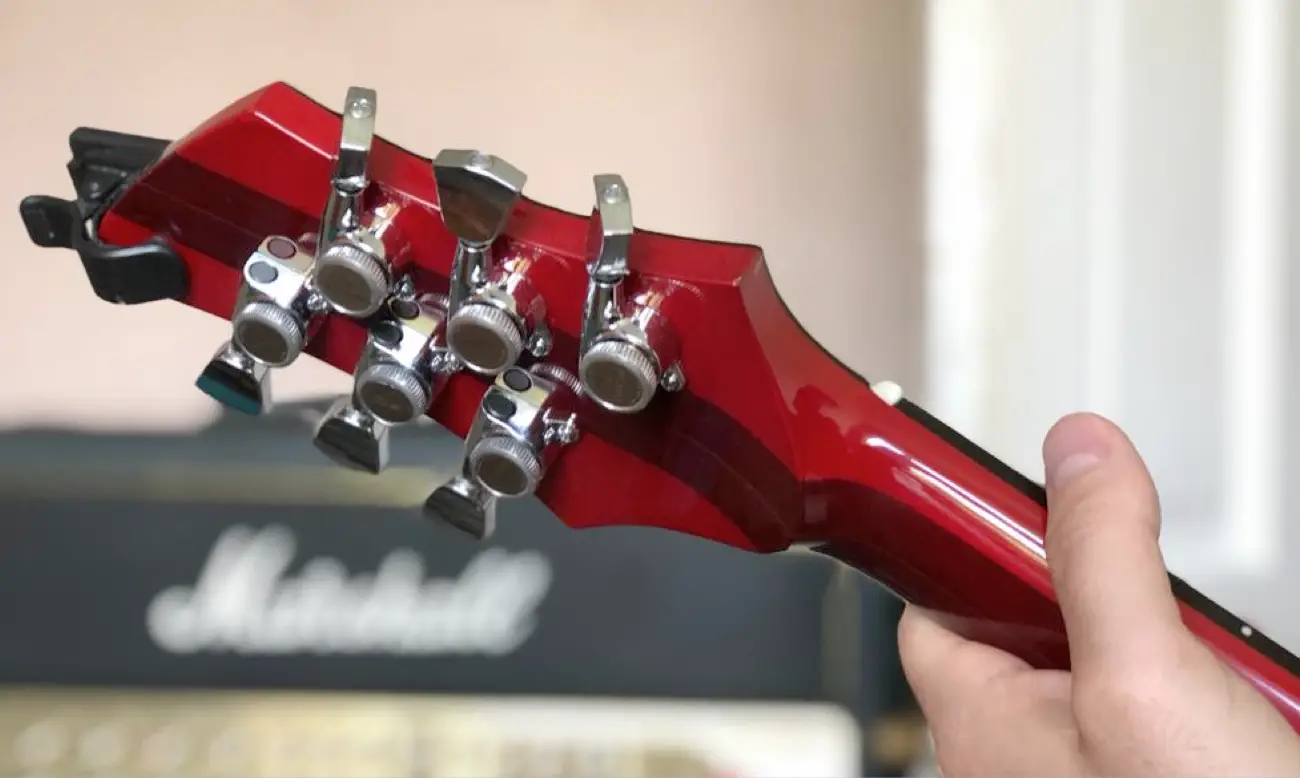If you have a guitar that you want to restring and haven’t played it in a while, then you have probably forgot what gauge strings you had on before.
How to measure string gauge on guitar? The string gauge on a guitar is determined by the thickness of the high E string. You can measure the string gauges by using specialised precision measuring equipment such as Micrometers, and Calipers.
In this article, we will go look at measuring string gauges in more detail.
1. What are string gauges on guitar?
String gauge is the thickness/diameter of a guitar string. Guitar strings are very thin in diameter and the difference between gauges is so minuscular that you need a specialised device that will accurately tell you the string gauge.
Strings Sets
The five most common packs include, 8’s 9’s, 10’s 11’s and 12’s. This number is important as it represents the thickness of the low E string (see section 4). In addition, some brands such as D’Addario they give general names to their string sizes such as light, medium, or thick.
String Gauge Sizes in Sets
As discussed above, companies refer to their string sets/packs by the thinnest string in the bundle. However, just knowing the pack size isn’t always enough as the other strings in the pack may not corresponding to the strings on your guitar.
Therefore, it is important to understand what you’re buying and what’s changing when you buy a new set.
2. The Importance of Replacing to the Same Gauge?
Once you know what strings sounds best for you and matches your playing style, selecting and changing your guitar strings is a breeze.
Until then, all the various string gauge combinations and brands can be a massive headache. You’ll need to choose a set of strings with a suitable string gauge correlating to your instrument, your style of music and the way you play.
When you find the set of strings you are looking for you then need to setup your guitar so it can handle those strings. You need to make sure you replace to the same gauge else it can add additional strain on your neck as well as cause you tuning problems.
3. Why String Gauge Matters?
Guitar strings have a bigger impact on your music and how you play than you would believe.
- Tone – Different gauges produce different tones, which directly contributes towards the style you wish to play, the type of guitar you are playing, and which pickup you choose to use. All these small factors are amplified when in the studio and go through the mixing process.
- Style – thick strings are ideal for riffing such as rock and metal music that calls for fuller tones and drop tunings. However, thinner strings resonate better for soloing.
- Playability – Thicker strings will assist you improve your fretting hand’s picking strength and endurance. When compared to a thinner set, you’ll realize how much more work you must put into fretting and picking as you progress as a musician.
Overall, string gauge is a very important consideration every guitarist must consider and there are many variables to consider.
4. How to Measure the Gauge of a Guitar String?
To accurately read what gauge your guitar strings are, you will need to understand what the gauge represent. For example, size 9 guitar strings mean the thickness of low e string is nine-thousandths of an inch. In engineering terms, this would represent 0.009″, and we would refer to this as being 9 thou.
Because these are such tiny measurements you will need a device that can accurately measure to a thousandth of an inch. This can be done easily when choosing the correct measuring device. You will require you to check the resolution specification. The resolution specification you want will be labelled as 0.0005″, or 0.01mm.
Sometimes the specification will be shown as inches and other times it will be shown as milometers. If you want to clarify the specification, just make sure that if you are looking at the inch resolution that will have 3 zeros after the decimal place.
5. Which Measuring Devices do I Recommend for Measuring String Gauge?
So as discussed you can either use a caliper or a micrometer. If you are looking for the best quality then choose the Mitutoyo option. If you would like a cheaper option, I would recommended the budget DML brand. I personally use these, they are cheaper and they do the job just fine.
Caliper
If you are looking for a caliper to measure string gauge then there are two i highly recommend. The Mitutoyo 500-196-30 is by far the best in terms of performance and durability. However, the price is much higher than a guitarist would like to pay and so i recommend a cheaper brand that is a very close second but at a affordable price.
Mitutoyo 500-196-30 Digital Caliper (Most Recommended)

The Mitutoyo Caliper 500-196-30
500-196-30 is the one of the best precision measuring instruments on the market. It can be smashed about and consistently reads accurately so you cant go wrong!
is the one of the best precision measuring instruments on the market. It can be smashed about and consistently reads accurately so you cant go wrong!
DML Caliper (Most Affordable)

The DC54150 Digital Caliper is a budget caliper it still performs well and in my experience it can be dropped and will maintain its accuracy over time.
is a budget caliper it still performs well and in my experience it can be dropped and will maintain its accuracy over time.
Micrometer
Micrometers offer more accuracy and can measure to a higher degree than calipers and so they cost slightly more. But, you do get what you pay for! Again, the Mitutoyo 293-821-30 is the best in terms of performance and durability. But, the price is quite high, and so i personally recommend DML brand as even though they are a cheaper option they perform exceptionally well.
Mitutoyo 293-821-30 Digital Micrometer (Most Accuracy)

The 293-821-30 micrometer is the most basic Mitutoyo Micrometer
micrometer is the most basic Mitutoyo Micrometer on the market. It is very durable and more accurate than the caliper. This is by far the best item i recommend but also most expensive.
on the market. It is very durable and more accurate than the caliper. This is by far the best item i recommend but also most expensive.
DML Micrometer (High Accuracy & Affordable)

The DM1025 Digital Micrometer a budget version of the Mitutoyo but it in my experience it performs well, it can be dropped and will maintain its accuracy over time.
Conclusion
String gauge is the thickness/diameter of a guitar string.
The thinnest string in a guitar string pack is commonly referred to as the pack’s name. The string becomes thinner as the number decreases. The thicker it is, the higher the number. A.008 string, for example, is incredibly light and is typically used for the thinnest string on an electric guitar. A.056 is extremely thick, and it would be the thickest string on a six-string guitar.
1/1000th of an inch is represented by the gauge. A 10-gauge string, for example, is 0.010 inches thick.
Guitar string packs are referred to as thinnest string in the pack, this will always be the high E string.
Below, we compare two sets of strings:
- Size 9’s String gauges – .009 (high E) .011 (B) .016 (G) .024 (D) .032 (A) .042 (Low E)
- Size 11’s String gauges – .011 (high E) .015 (B) .018 (G) .026 (D) .036 (B) .050 (Low E)
Take note of how the first set’s gauge sets are thinner throughout the board. Many beginner guitarists will find these simpler to play because they demand less finger strength. They don’t require as much force, but they do necessitate Because they require less finger strength, they are easier to play. They don’t demand as much force, but they do necessitate a higher level of precision. Thicker strings will help you enhance the strength and endurance of your fretting hand’s picking. As you advance as a musician, you’ll notice how much more effort you have to put into fretting and picking when compared to a thinner set.

